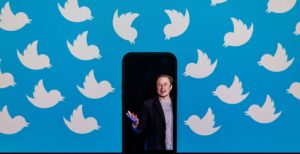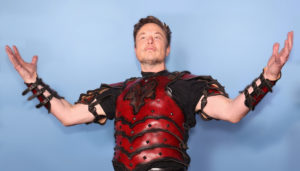It is often declared that Twitter is not real life; too rarely does anyone add, because it’s far more important. As the primary vector for the construction and dissemination of political narratives, social media has become the central battleground where all conflicts short of open war are fought, based on firmly-held beliefs that rarely have a secure grounding in objective reality. What use does mere reality have, other than as kindling for the far brighter flames of political myth? No wonder, as the ongoing Twitter Files disclosures show, the company is riddled with bureaucrats of the American security state: there is no reason to doubt that the same is true of Instagram or Facebook, nor that the Chinese aren’t doing the same with TikTok and the Russians with Telegram.
Where America is unique among the rival great powers jostling for mastery of the century to come is its distraction fighting a still-virtual civil war on social media at the same time. In the midst of this global contest, we as social media consumers are like some luckless peasant community of a contested borderland, simultaneously the justification for the war, through their expressions of sincere concern for our safety and security, and the battleground, through the harvesting of our data and the endless background turmoil that now fills our lives.
Into this bearpit strode Elon Musk, carrying a sink, with a stated vision of remaking Twitter according to the dreams of its founders barely a decade ago as the “global town square”. The phrase, redolent of Socratic dialogue beneath some shaded colonnade, seems quaintly inappropriate. Few Americans, and fewer foreigners, would wish to linger long in San Francisco’s real-world urban plazas, and their virtual replacement is hardly more congenial. In the real world, far beyond the ayahuasca visions of the site’s unworldly founder, the central square is as often a place of repression and public execution as of well-ordered debate and conviviality; it is the place where political power is expressed through the raising or toppling of statues, bloody revolutions, and intimidating displays of force.
The tiresome and self-defeating illusion of many conservatives, like that of any Hyde Park orator, is that if only the passing public were given free exposure to the brilliance of their dialogue, they would soon become converts. It is the precise illusion punctured by the German political theorist Carl Schmitt, in his 1922 work Political Theology, when he observed that “a class that shifts all political activity onto the plane of conversation in the press and in parliament is no match for social conflict,” for as he notes, “the essence of liberalism is negotiation, a cautious half measure, in the hope that the definitive dispute, the decisive bloody battle, can be transformed into a parliamentary debate and permit the decision to be suspended forever in an everlasting discussion.”
But it cannot, and here we see the essential contradiction of Musk’s self-imposed mission: the conflict between free speech and the good of the community is fundamentally unresolvable. Decisions will always finally have to be made by someone, and those decisions are always by their nature political, arbitrary, and thus always a source of dispute. For the essence of politics lies in the final decision for Schmitt, then still writing as a fashionable intellectual of the Catholic Centre Party, aiming to save the Weimar state from its own dysfunction: his remorseless logic had not yet driven him to embrace the disastrous political form which gives his reputation its current frisson. Schmitt’s fundamental insight is more applicable to the Musk case than we may at first think: for now Musk has found himself mired in the ad hoc policing of speech on the site, whether through Twitter polls, or his own arbitrary decisions.
For Schmitt, this is all as it should be: the arbitrariness is the point, as the sovereign reveals himself as such through “a pure decision not based on reason and discussion and not justifying itself, that is, to an absolute decision created out of nothingness”. For at times of crisis, unresolvable in terms of ordinary politics, comes the state of exception in which sovereign power unveils itself, cutting the Gordian knot of political deadlock: “at times it does so as a deus ex machina, to decide according to positive statute a controversy that the independent act of juristic perception failed to bring to a generally plausible solution; at other times it does so as the graceful and merciful lord who proves by pardons and amnesties his supremacy over his own laws”.
This tension reveals itself at its most political in the edge cases, the debatable borderlands where what is lawful may outrun what is good for the community. Again, this aligns with Schmitt’s insight: his opening line from Political Theology, that “Sovereign is he who decides on the exception,” is immediately followed by the observation that, “only this definition can do justice to a borderline concept,” indeed, this very “definition of sovereignty must … be associated with a borderline case and not with routine.” That is, only those cases where the course of action is contested are by their nature political: and only through the final act of decision, one way or another, does the political sovereign reveal himself.
On Twitter, the edge cases are those, like Trump’s presence, on which the preservation of America’s political order have been stated to depend, and on the content most widely considered objectionable by society as a whole: jihadist and extreme Right-wing invocations to terrorist violence, and child exploitation content. Back in an earlier iteration of the platform, before the political community reached a consensus that groups such as Islamic State should not be allowed to openly congregate on social media, Twitter became one of the prime vectors of jihadist propaganda, recruitment and social interaction. It was interesting, even amusing at first, to engage in back and forth debates and snarky banter with Islamic State fighters on Twitter; then it became horrifying and unbearable as the group hurtled further into its darkness. From being a reporter whose career was largely based on the juxtaposition of monitoring Isis content on social media, while reporting the battle on the ground against their physical manifestation in Syria and Iraq, I eventually had to stop following Isis content at all: the constant blurring of the virtual and the real, between London and the Middle East, became too jarring. But is it true, as has recently been claimed, that Musk’s commitment to free speech will lead to a terrorist revival on the platform?
Experts are undecided. Moustafa Ayad, an analyst with the Institute for Strategic Dialogue thinktank monitoring jihadist use of the platform, told me that on Twitter, “the rate of Islamic State accounts being set up or used to spread propaganda has increased over the past two months under new management”, perhaps due to lax moderation as “most moderation teams have been gutted (despite public statements to the contrary) of the context and subject matter expertise required to effectively go after terror-supporting accounts.” Yet Twitter remains a site of negligible activity for the group, compared with other apps such as Telegram where discourse is far less tightly monitored (at least overtly). On Twitter, supporters of Islamic State evade banning through avoiding open encitements to terrorist violence. As Ayad notes, “They primarily stay away from posting violent content to inhabit ‘legal grey areas,’ but they continue to post branded terrorist content and share legacy material, old videos, sermons and series. They will similarly use the phrase ‘IS,’ as a means to reference the Islamic State and still argue that they were referring to the concept of an Islamic state and not the group.” It is illegal to advocate for the Islamic State, after all, but not for an Islamic state: a distinction of which Anjem Choudary finally fell foul when forced by events to upgrade his fealty from the theoretical to the real.
Laith Alkhouri, CEO of Intelonyx Intelligence Advisory, told me that he has not “not seen an uptick in accounts returning since Musk took the helm”, as groups such as Isis already have secure and thriving networks on far less rigorously policed social media platforms. Like Ayad, Alkhouri notes that the surviving Isis Twitter accounts maintain their presence by avoiding explicit celebration of violence. The accounts he has seen “mostly focus on religious content, abstain from posting images/videos or Isis branded content, and refrain from mentioning Isis as a group. I think these evasion techniques help keep accounts alive.”
Due to the nature of America’s internal political conflict, the policing of Right-wing speech is a more contentious matter than that of jihadist content: jihadist terrorism may kill far more people, but it does not threaten the political order, in the eyes of the political mainstream. Lucas Webber, co-founder and editor of the Militant Wire consultancy, told me that “There is nowhere near the level of terrorism-related content on Twitter compared to the peak IS in Iraq/Syria era of the mid 2010s. However, some extremist elements and ideological armed movements have adapted and manoeuvre around Terms of Service violations.” The Russian extreme-Right Rusich militia, fighting in Ukraine, uses Twitter to “funnel supporters” onto Russian-owned platforms, “and then fundraise from this support base to provide Rusich with weapons, drones, medical supplies, and more – things that have a real-world impact and are used to kill Ukrainians”. As Webber notes, “elements from the “TerrorGram” movement were quite pleased when Elon Musk took over and expressed their excitement about leveraging the platform to grow their international support network. This could ultimately result in direct acts of violence — for example, the recent Bratislava LGBTQ bar shooter was deeply immersed in this space and posted on Twitter during and after the attack.”
But in Webber’s opinion, “the hysteria from public figures and the mainstream media seems to be largely politically motivated and blown out of proportion. However, the loosening of restrictions will inevitably give more space and oxygen to extremist actors to spread their message and promote their cause.” While decision-making on the edge cases of acceptable speech remains largely arbitrary as “Musk has taken a kind of brute force approach and is aggressively forging his vision through trial and error rather than any real coherent terms of service,” Webber believes that “this aspect will become more institutionalised and stable over time, and this is where it could either revert to type, or settle on set and consistently enforced rules that provide more freedom for political dissidents, conservatives, Right wingers etc to express their opinions”. Yet it is here, in the debatable lands between legitimate Right-wing critique of the current order, and assertions of the need to violently overthrow it, that Twitter’s speech policies have been most fraught: where does Trump, now facing criminal charges for “insurrection” fit in, having declared on January 6 a state of exception he did not bother to attend? The broadly liberal political establishment may have overreached in its muzzling of Right-wing discourse, but even here lines will eventually have to be drawn by someone, and the final decisions made will always be by their nature arbitrary.
On the heated question of child exploitation content, similar edge cases will always remain a source of political conflict. Though initially disputed by many, experts now agree that Twitter before Musk’s takeover was markedly lax in taking down child abuse material, with the Internet Watch Foundation claiming in 2019 that the site was responsible for 40% of the illegal content hosted on the public internet. Even here, legal grey areas and ambiguities remain, and will, therefore, remain a source of political conflict as the dividing lines are contested. Like Instagram and TikTok, Twitter remains host to legal but unseemly material derived from underaged social media influencers: the task of distinguishing between what is legal and what is morally acceptable proved such a headache for Tumblr that it ended up banning all glamour content (in the process driving adult pornographic influencers to Twitter en masse). Though vastly more reported — and this can only be because it has become a source of heated political distinction between the two American political factions — just the same case can be made regarding the confluence of children and drag performances now driving the American “groomer” discourse.
As the tech writer Jon Stokes observes in this excellent recent essay, the politics of sex has become the central dividing line of American political conflict. As Stokes enumerates, “Drag Queen Story Hour, Drag Brunch for kids, Kids putting dollar bills into strippers’ thongs, doing pole dancing with strippers, or some other sex-work-related activity, School books that present sex work to kids as just another kind of work, Pride parades with kink on full display and kids present and even participating, Drag kids, Child beauty pageants, Evangelical purity balls, Gay conversion therapy, Porn use by teens” have superseded race as the central battlegrounds on which America’s two political factions contest social media. Sharply divided by the politics of sex in general, the conflict between liberals and conservatives is most heated precisely where the stakes are highest — in the protection of children — and where the boundary between what is legal and what is morally acceptable is so contested.
In all of these vexed debates, the central political question is, as Schmitt observed, Who decides? Who decides who may stay on Twitter, and who must be banished from the town square? Who can pluck Kanye West or the former president from their ignominious exile, and thrust them back into silence when they reoffend? It is only Musk, exercising his sovereign power. Where such decisions were once obscure, seemingly nudged behind the scenes by functionaries of the American security state, now they are on display, to be hissed or applauded by the crowd, as if watching an emperor decide the fate of a wounded gladiator. This situation cannot go on for long, but in observing the contours of the present battleground, we are given insight into both Schmitt’s thought and into the contradictory, unresolvable tensions within conservatism between advocating free speech for all that is legal, and opposing that which is harmful
In his 1929 lecture The Age of Neutralisations and Depoliticisations, Schmitt mocked the technological utopians of his day, who, like Twitter’s founders, believed that “technology appeared to be a domain of peace, understanding, and reconciliation,” where “all peoples and nations, all classes and religions, all generations and races appear to be able to agree” because “unlike theological, metaphysical, moral, and even economic questions, which are forever debatable, purely technical problems have something refreshingly factual about them.” No, warned Schmitt, it is precisely the opposite: “Technology is always only an instrument and weapon; precisely because it serves all, it is not neutral.”
As he observes, in a passage that skewers the initial Utopian dreams of Silicon Valley, “If humanitarian-moral progress is still expected by many today from the perfection of technology, it is because technology is magically linked to morality on the somewhat naive assumption that the splendid array of contemporary technology will be used only as intended… and that they themselves will control these frightful weapons and wield this monstrous power.” Yet this is a grave misunderstanding, Schmitt warns: “Technology is no longer neutral ground” but instead, “every strong politics will make use of it” in ways which “will be revealed only when it is known which type of politics is strong enough to master the new technology and which type of genuine friend-enemy groupings can develop on this new ground”.
It is in the friend-enemy groupings coalescing on social media, particularly on Twitter, that the political battleground deciding our future has been drawn, and it is in the battle for who controls the edge cases of acceptable speech, that the power to make the arbitrary decisions defining political sovereignty resides. It is a marvel of America’s political culture that, at precisely its moment of greatest internal conflict since its civil war, the world’s richest man could buy himself, if not the throne itself, what is likely to be a veto on who next ascends it. Similarly, for all that Schmitt has re-emerged as a source of political inspiration on the Right following his 2000s adoption by the populist Left, it was America’s liberal establishment that revealed themselves the true Schmittians, in their urge to save American democracy from its errant voters. Under their guidance, echoing Schmitt’s definition of crisis as where “a case of extreme peril, a danger to the existence of the state” exists, American politics since 2016 has become a permanent state of exception, in which the diminution of sovereign power in the White House was manifest largely through manipulation of social media.
Like an absent-minded ascetic king, Jack Dorsey accidentally built a site of great, yet unclearly defined political power, certainly greater than many nation-states: when, by threatening Musk with sanctions, we see the European Union try to assert its own sovereignty, power frankly does not seem weighted in Europe’s favour. Whether or not Musk wishes to keep this power is an unresolved question: as he has recently declared, “Those who want power are the ones who least deserve it.” It is now too late for us to debate whether or not such power should exist: the fundamental question, for Twitter as for American politics, remains unresolved: who next decides?
Disclaimer
Some of the posts we share are controversial and we do not necessarily agree with them in the whole extend. Sometimes we agree with the content or part of it but we do not agree with the narration or language. Nevertheless we find them somehow interesting, valuable and/or informative or we share them, because we strongly believe in freedom of speech, free press and journalism. We strongly encourage you to have a critical approach to all the content, do your own research and analysis to build your own opinion.
We would be glad to have your feedback.
Source: UnHerd Read the original article here: https://unherd.com/




